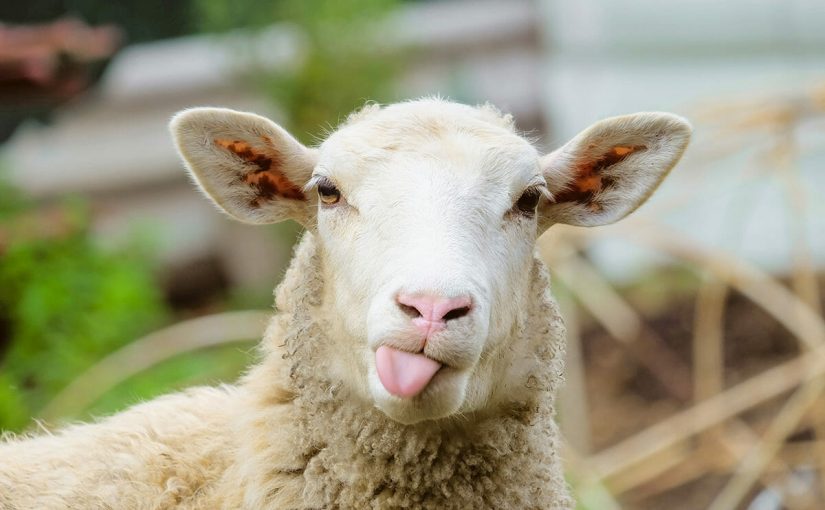A homily for the Fourth Sunday of Easter, May 3, 2020
Acts 2:14a, 36-41, 1 Pt 2:20b-25, Jn 10:1-10
We should start with a little history, my personal history. Nine years plus two weeks ago, the day after my ordination, I preached officially for the first time at my Mass of Thanksgiving, and it was this Gospel. Jesus as the Sheepgate. So it would be cheating — never a good thing for a man of the cloth — for me to dredge up that homily and post it today, hoping that my beloved parishioners would (a) have forgotten it or (b) remember it yet forgive me for playing a greatest hit.
And I think — I hope — my preaching has matured a bit since that nervous first homily.
Besides, I couldn’t find it.
Now, before my reflection for this week, a minor rant, if I may.
The closing line of today’s Gospel passage — “I came so that they might have life and have it more abundantly.” — is a notion that televangelists and their ilk royally abuse again and again. I’m to the point where “abundant” and “abundance” make me cringe every I hear them, regardless of the context or usage.
Jesus is talking about grace, life in the spirit, peace of mind, peace of soul, God’s Peace when he promises abundant life (cringe!). No Gulfstream jets are involved, no gold toilets, no Georgetown gardens showered in cherry blossoms. If you’re lucky enough that this world happens to bestow those on you, God bless you, and may you share your blessings. Jesus, though, is offering plentiful life in the spirit to those who choose to follow him, follow his voice as their shepherd.
I could be persuaded to pray for a power failure or two at some houses of worship during their telecasts, especially when the 1-800-GIMME-GIMME number comes on the screen.
(Brief pause to compose myself.)
So: How ’bout that sheepgate, huh.
Sheep, so I’m told, are not stupid and are not blind followers, despite the bad rap they get. Followers, yes, but selective ones. They know whom to follow, just as we should — the Good Shepherd.
“I know mine and mine know me.”
Doesn’t get any better than that. Follow our Shepherd. Our Shepherd loves us.
Case closed.
Homily over.
Except…
How does Jesus know his sheep? How do his sheep — us — know him?
Two things come to mind: A good sense of direction and a great relationship built on trust.
Sheep are herd animals; they instinctively flock together for protection, for shared warmth, for companionship. They move together in a common direction, either when herded or when the aforementioned instinct tells them they need to head this-a-way or that-a-way.
Are we going the right way? A good shepherd or a good alpha sheep leads them to green pastures and away from danger. The flock’s shared sense of direction tells them if it’s otherwise.
Following the alpha sheep is hard-wired into the critters. Following the shepherd is learned behavior, and in herd animals, positive reinforcement is what locks in the desired pattern. Sheep follow a good shepherd because, simply enough, the shepherd is good to his sheep.
Are we going the right way? Yes, because the Good Shepherd is in the lead.
If a shepherd were abusive or otherwise untrustworthy, the sheep might follow, but only because they were prodded.
We, the flock of Jesus …
We, the ones who hope to be on his right on Judgment Day, having fed and clothed and sheltered and visited the least of Christ’s sisters and brothers (Mt 25:40) …
We have a little problem being shepherded these days. Not all of us are acting like sheep that have a good relationship with our shepherd who wants us to put the good of the flock ahead of our individual wants.
The only “herd” we’ve heard lately has been herd immunity.
The only gatherings of flocks have been misguided people clamoring for the right to catch and spread COVID-19.
 In other words, goats.
In other words, goats.
The ones Jesus says he’ll put on his left side and cast out. Ugh.
Goats may flock together as sheep do, but it’s clear to any observer that they are flocks of individuals. Their energetic playfulness, their head-butting games are demonstrations of competitiveness. A lot of alpha behavior.
It takes much more effort to herd goats, because they’re wily. They know better than their herder, or at least they think they do. They definitely know better than whatever alpha goat Mother Nature put in front of them, because every goat wants to be the leader.
If they were human, we’d call them selfish.
Well … maybe that’s harsh. If they were human, we’d probably call them rugged. Because, of course, America is the land of the rugged individual, the westward-ho rancher who followed Manifest Destiny clear to the Pacific Ocean and then knit the country together with the Golden Spike.
Self-reliant. Loners, even. But rugged.
But just as sheep are saddled with misconceptions, so too are many people who look like goats, as our stay-at-home coronavirus lifestyle is proving.
Those rugged individuals in the 1800s, these rugged individuals now are outstanding at stepping up whenever, wherever there’s a job to be done to help someone. No need to ask, no questions asked. They step in, they help, they step back out of the picture. But not completely out.
Sheep? Goats?
In the end, it will be up to Jesus to decide.
Without a doubt, putting the herd first is a massive challenge these days, far more than ever. But our Good Shepherd leads us to meadows and streams if we follow.
All we have to do is listen for his voice.
